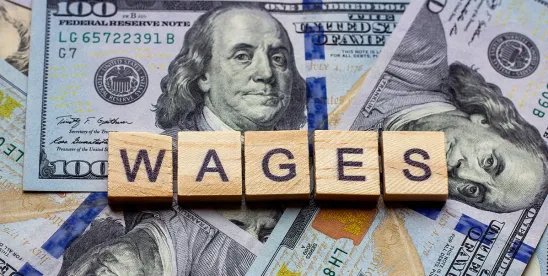Commissions are always considered wages under New Jersey’s Wage Payment Law (“NJWPL”). This is the first time the New Jersey Supreme Court has spoken on the issue, and it limits the flexibility employers have regarding such payments moving forward.
The Supreme Court’s recent declaration in Musker v. Suuchi, Inc., docket no. A-8-24, arose from a dispute over a commission employer Suuchi owed to salesperson Rosalyn Musker for her personal protective equipment (“PPE”) sales during the COVID-19 pandemic. Musker earned a base salary, along with a commission that was normally based on her gross revenues, but Suuchi determined that the PPE commission would instead be based on net revenues. Musker filed suit, claiming the company violated the NJWPL by failing to pay her commission based on gross revenues. The trial court dismissed the NJWPL claim, finding that the commissions at issue were a sort of “supplementary incentive” payment explicitly excluded from the NJWPL’s definition of wages. The Appellate Division agreed, adopting the rationale of a 2005 federal matter, Sluka v. Landau Uniforms, Inc., 383 F. Supp. 2d 649 (D.N.J. 2005), by reasoning that the function of some commissions was not just to compensate for labor performed, but to “motivate and reward a salesperson who creates more business each year.” See Musker v. Suuchi, Inc., 479 N.J. Super. 38, 59–61 (App. Div. 2024). The Appellate Division added that the PPE commissions were “special compensation” intended to “stimulate” Musker and her sales colleagues “during a time of sudden pandemic-related demand.”
The Supreme Court disagreed, emphasizing that the intention to motivate does not dictate whether a payment is deemed a “supplementary incentive” because all compensation is intended to motivate employees—“That is a simple matter of common sense.” Slip op. at 12. Instead, the Court made clear the correct question is whether the compensation incentivizes employees to do something beyond just supplying their “labor or services”; only then can it be a “supplementary incentive” that is excluded under the NJWPL.
Applying this logic, the Court reached the “straightforward” conclusion that Musker’s PPE commissions were wages under the NJWPL. Although Suuchi’s commission structure was unique, the Court confirmed that its rule was essentially universal: “[B]ecause a commission directly compensates an employee for performing a service, it always meets the definition of ‘wages’” under the NJWPL. Slip op. at 11. In contrast, non-wages can include incentives unrelated to labor or services, like sharing office space, achieving perfect attendance, working out of a particular location, or referring someone for an open position.
While the Court’s decision was limited to commissions, the implications of the Court’s dicta could extend beyond commissions to other forms of payments that do not truly incentivize employees to do something above and beyond supplying their “labor or services.” Once wages are “earned,” employers are responsible for payment per the NJWPL. In light of the Supreme Court’s guidance on this issue, employers should review their payment policies and practices—including those related to commission payments—to ensure they contain clear language regarding when such wages are earned and fully comply with the NJWPL.




 />i
/>i

